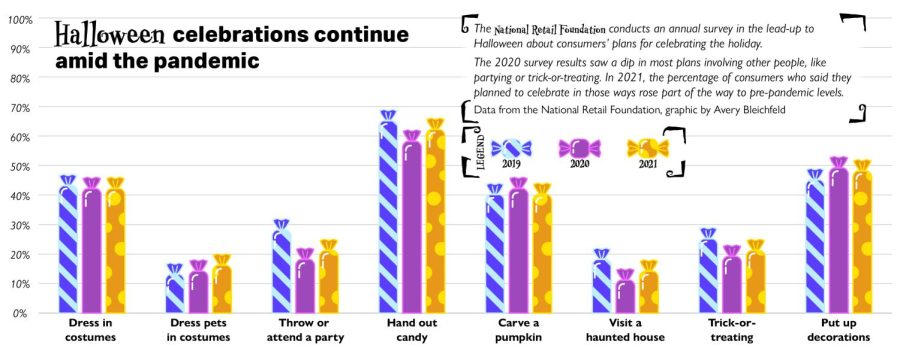Op-ed: Trick-or-treating and Halloween parties are back, sort of
Data visualization by Avery Bleichfeld
Despite the desire to return to a “normal” Halloween, society must be careful in order to lessen the spread of COVID-19.
October 30, 2021
With the Centers for Disease Control and Prevention, or CDC, approving Halloween’s annual trick-or-treating event in the United States, children have a well-deserved chance to see their friends and have a good time. Along with the idea of outdoor college parties on this holiday, trustworthy experts all over the country have approved Halloween festivities. In fact, Dr. Anthony Fauci, the nation’s most reputable infectious disease expert, says children and students should “go out there and enjoy Halloween” because outdoor festivities are completely safe. Yet, there are still prevalent issues that many students and families are stressing over.
While children and adults should have fun, there are many precautionary measures that should be implemented to ensure public safety. There are still issues that prevent Halloween from being completely safe, even after specific guidelines are followed.
- Large groups are inevitable.
When traveling to houses, especially in small neighborhoods, children tend to wait in long lines or talk with each other and exchange candy. This is not a practical idea, and even though Halloween takes place outside, social distancing is still vital to prevent anyone from getting sick. Although the general tradition of trick-or-treating is deemed safe, it is important costume-wearers travel in small groups near a central location to avoid boxed-in candy counting/trading scenarios.
Krystal Pollitt, the assistant professor of environmental health sciences at Yale’s School of Public Health, said Halloween can be handled safely, and it will not pose significant risks to COVID-19 outbreaks if social distancing precautions are taken seriously and children wear masks properly when around others. In addition, college parties usually occur around the holidays; however, it would be safer to do so in small capacities or outdoors. When doing so, masks should be worn properly, and students should be given access to wash their hands frequently to prevent spreading the virus.
“We don’t want a large group of children congregating at doorsteps,” Pollitt said in an interview with USA Today. “Smaller groups for very short durations at someone’s door is advised.”
- Masks may be considered a hindrance, so children are less likely to follow mask mandates.
During Halloween, it’s very unlikely that children will keep their masks on for the entire night. While trick-or-treating, kids will get tired of wearing their mask, it can fall below their nose and mouth or they could simply want a break from wearing one. Ultimately, parents should prepare their children and make sure they understand the risks that follow. At Northeastern, students are being required to wear masks when on campus and take COVID-19 tests weekly. While vaccines are slowly becoming mandatory.
To contribute to community safety regarding specific necessary guidelines, Northeastern students can encourage wearing masks properly and washing their hands before leaving home. Additionally, costume masks will not prevent the coronavirus from spreading, so it’s important to make sure children are well protected with a mask covering their nose and mouth.
- Touching surfaces of candy can spread COVID-19.
The BBC reported that coronavirus transmission through food packaging is unlikely, but it is still possible. In order to prevent this, children should carry portable bottles of hand sanitizer and let their parents sanitize their candy wrappers after returning home. At college parties, hosts should provide hand sanitizing stations to ensure student safety, while making recent negative COVID-19 tests (within the past 10 days) required for admission.
Children should keep their hands clean at all times, and even wearing gloves can be a highly effective prevention strategy. According to Healthline, the American Academy of Pediatrics recommends that all children wash their hands when they return home from trick-or-treating. Also, children should wear masks regardless of vaccination status — especially if they live with anyone that has preexisting health conditions.
- Partying on Halloween may not be ethical.
College parties are especially active during the holidays, so college students should be given a chance to have fun, right? Yes, but only when certain safety precautions are acknowledged. Northeastern reports that 99.6% of students are vaccinated, and while many people on other college campuses are vaccinated due to mandates, it may not be wise to attend any indoor events.
The Department of Public Health released a detailed list of Halloween precautionary measures, consistent with the Halloween activity guide released by the CDC, and experts recommend against attending indoor events — especially when masks are optional. So, if college students host any parties on Halloween night, it’s important to take certain precautions such as providing hand sanitizer for everyone, encouraging people to wash their hands and making sure masks are worn anytime indoors.
The Boston Police Department released a list of reminders Oct. 21 geared toward local college students. While discouraging big crowds, the CDC does not recommend attending any “crowded” parties on Halloween night and suggests wearing masks at all times while indoors. Overall, trick-or-treating and most Halloween events are outdoor activities, so taking precautionary measures against the virus seriously will significantly decrease the chance of increases in COVID-19 cases after Halloween.
Haley Alphonse is a first-year journalism major. She can be reached at alphonse.h@northeastern.edu.







